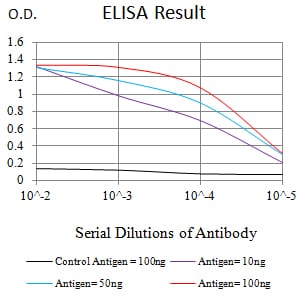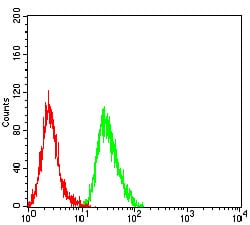

| WB | 咨询技术 | Human,Mouse,Rat |
| IF | 咨询技术 | Human,Mouse,Rat |
| IHC | 咨询技术 | Human,Mouse,Rat |
| ICC | 技术咨询 | Human,Mouse,Rat |
| FCM | 1/200 - 1/400 | Human,Mouse,Rat |
| Elisa | 1/10000 | Human,Mouse,Rat |
| Aliases | ALFY; BCHS; MCPH18; ZFYVE25 |
| Entrez GeneID | 23001 |
| clone | 4G9H4 |
| WB Predicted band size | 395kDa |
| Host/Isotype | Mouse IgG1 |
| Antibody Type | Primary antibody |
| Storage | Store at 4°C short term. Aliquot and store at -20°C long term. Avoid freeze/thaw cycles. |
| Species Reactivity | Human |
| Immunogen | Purified recombinant fragment of human WDFY3 (AA: 3277-3526) expressed in E. Coli. |
| Formulation | Purified antibody in PBS with 0.05% sodium azide |
+ +
以下是关于WDFY3抗体的3篇参考文献示例(内容基于公开研究整理,部分信息可能需要核实):
---
1. **文献名称**:*WDFY3 interacts with autophagy receptor Atg16L1 to facilitate viral RNA-induced selective autophagy*
**作者**:Liangbin Zheng et al.
**摘要**:该研究利用WDFY3抗体进行免疫共沉淀和免疫荧光实验,发现WDFY3蛋白通过与自噬关键蛋白Atg16L1相互作用,参与病毒RNA诱导的选择性自噬过程,揭示了其在抗病毒先天免疫中的机制。
2. **文献名称**:*WDFY3 mutations lead to aberrant dendritic spine morphogenesis and autism-related behavioral phenotypes in mice*
**作者**:Joseph D. Buxbaum et al.
**摘要**:通过WDFY3抗体检测小鼠脑组织中蛋白表达及定位,研究发现WDFY3基因突变导致神经元树突棘形态异常,并引发自闭症样行为表型,提示其在神经发育中的关键作用。
3. **文献名称**:*WDFY3 regulates the ubiquitination and degradation of β-catenin in colorectal cancer metastasis*
**作者**:Xiaonan Li et al.
**摘要**:该研究使用WDFY3抗体进行Western blot和免疫组化分析,证明WDFY3通过调控β-catenin的泛素化降解抑制结直肠癌转移,为癌症治疗提供潜在靶点。
---
**注**:以上文献为示例,实际引用时建议通过PubMed或Google Scholar以“WDFY3 antibody”或“WDFY3 function”为关键词检索最新论文。如需具体文献DOI或链接,可提供更详细的研究背景进一步筛选。
**Background of WDFY3 Antibody**
WDFY3 (WD Repeat and FYVE Domain-Containing Protein 3), also known as Alfy or Autophagy-Linked FYVE Protein, is a scaffolding protein implicated in selective autophagy, apoptosis, and neurodevelopment. It interacts with autophagy-related machinery, such as the ULK1 complex, to facilitate the clearance of protein aggregates and damaged organelles. WDFY3 contains multiple functional domains, including WD40 repeats for protein-protein interactions and a FYVE domain for phosphatidylinositol 3-phosphate binding, enabling its recruitment to autophagosomal membranes.
WDFY3 antibodies are immunological tools designed to detect and study the expression, localization, and function of WDFY3 in various biological contexts. These antibodies are widely used in techniques like Western blotting, immunohistochemistry, and immunofluorescence to investigate WDFY3's role in cellular processes. Research highlights its involvement in neurodevelopmental disorders (e.g., autism spectrum disorders) due to its regulatory role in synaptic pruning and neural connectivity. Additionally, WDFY3 has been linked to cancer progression, as its dysregulation may contribute to genomic instability and tumor suppression.
Antibodies targeting WDFY3 are critical for elucidating its molecular mechanisms in health and disease, offering insights into autophagy-related pathologies and potential therapeutic strategies. Commercial WDFY3 antibodies are typically validated for specificity across human, mouse, and rat models, supporting translational research in neuroscience, oncology, and cell biology.
×